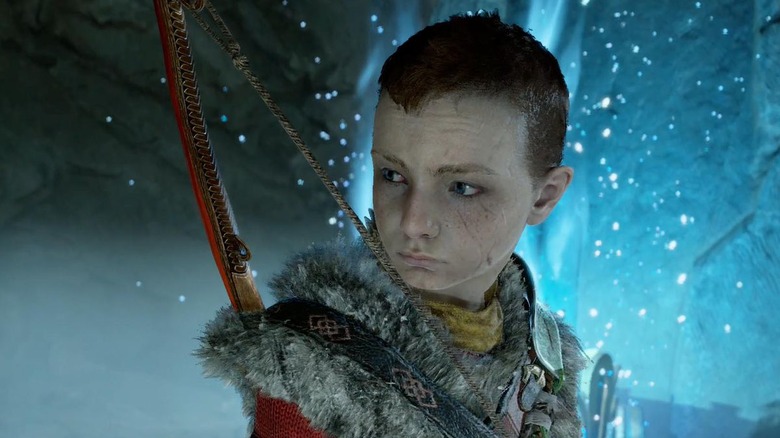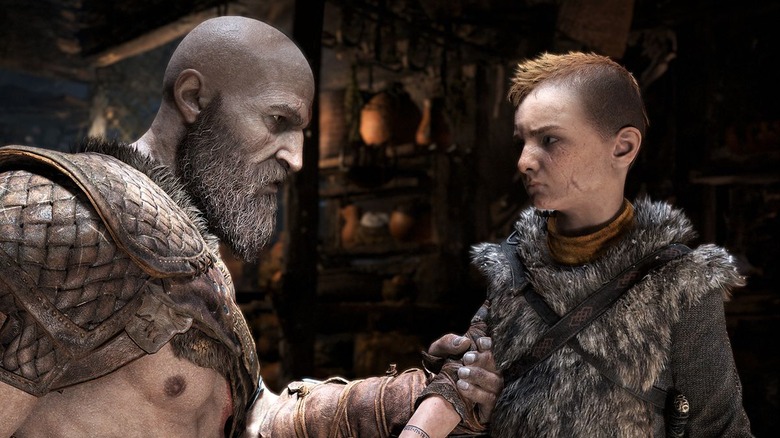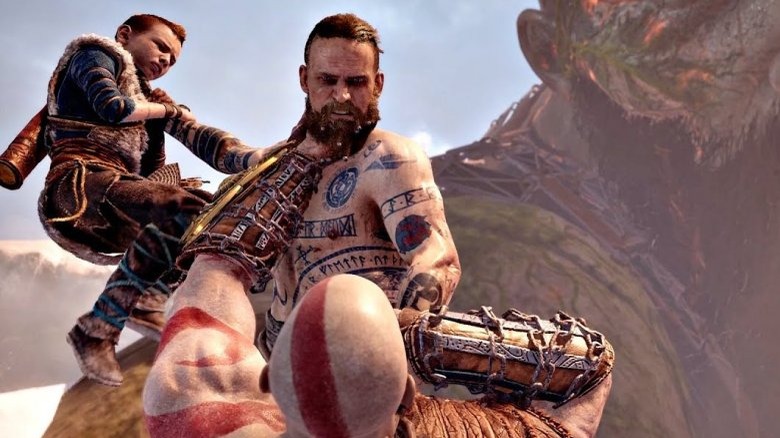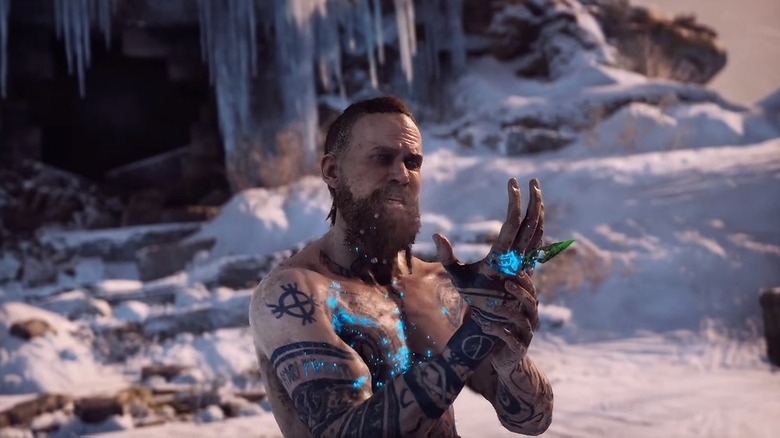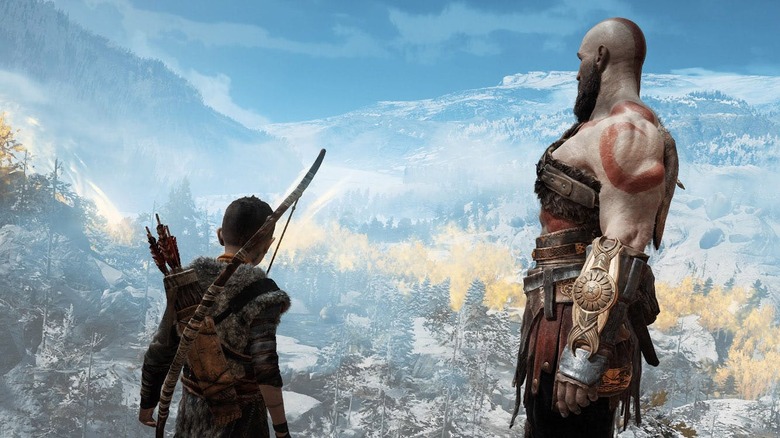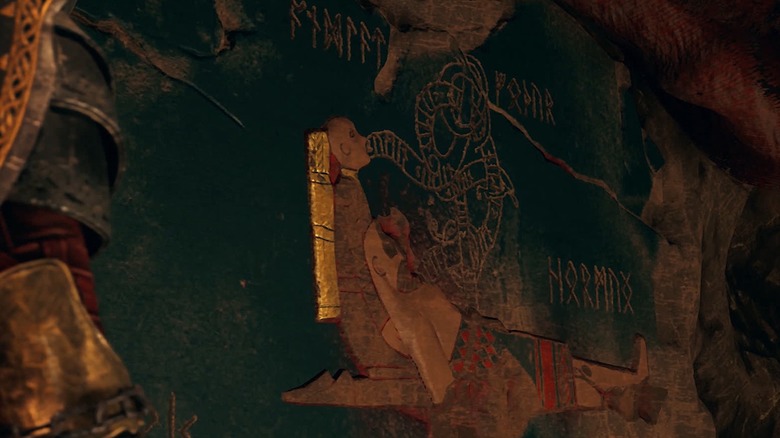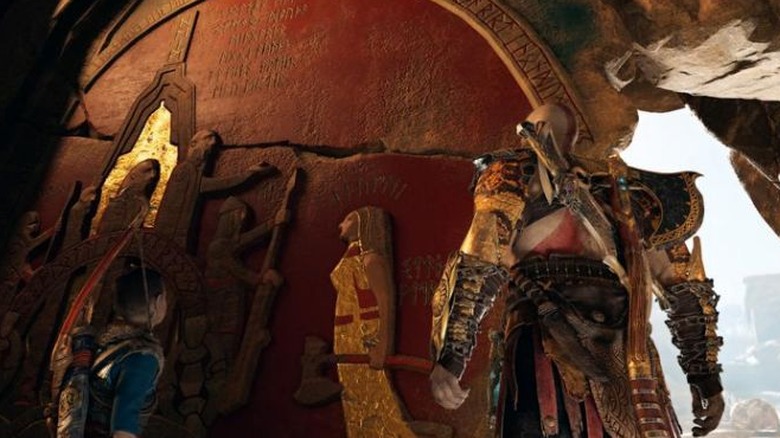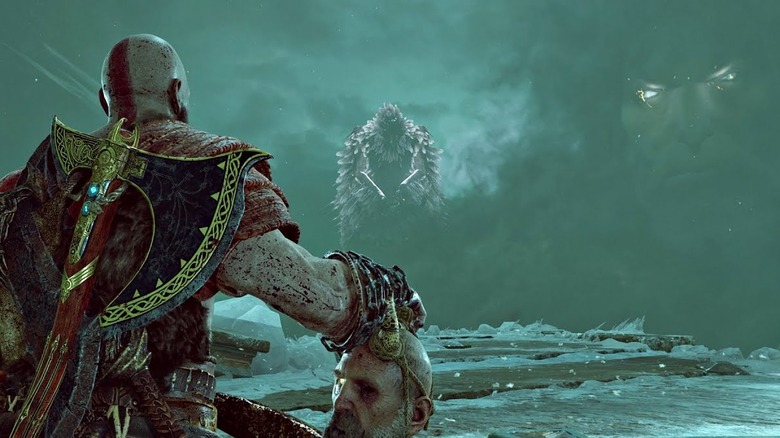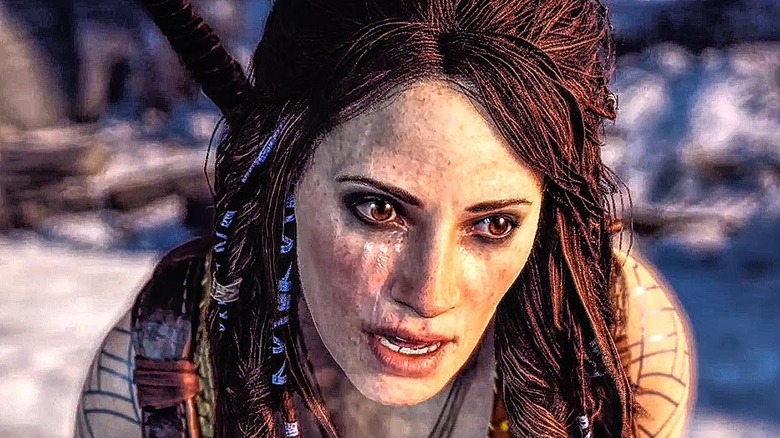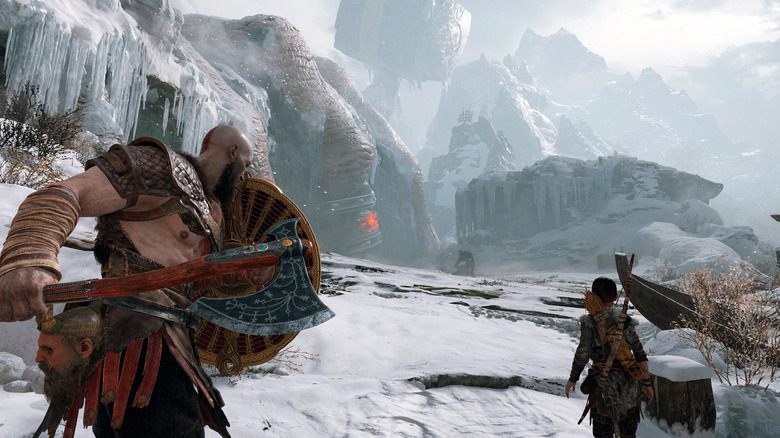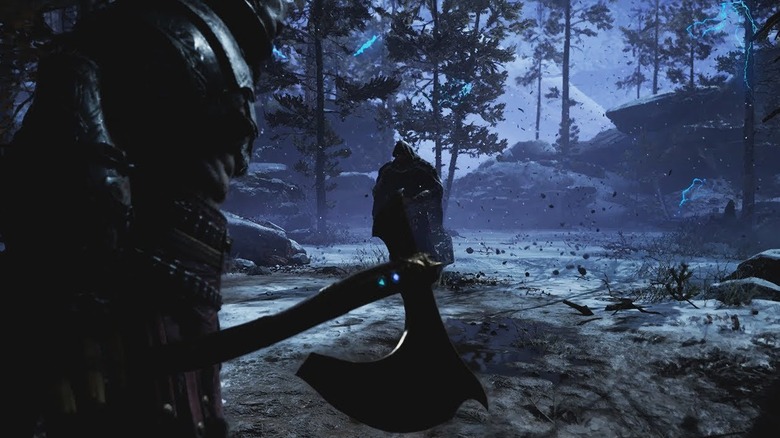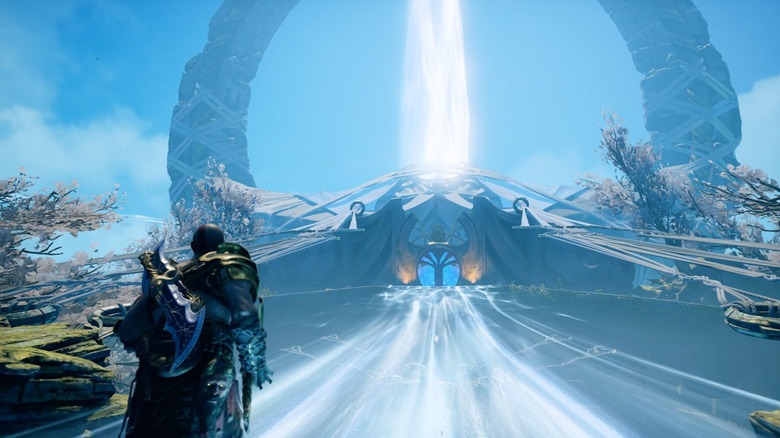We Finally Understand The Ending Of God Of War
2018's God of War returned players to the well-worn boots of Kratos, the Ghost of Sparta. Though it lacked a number in its title, the new game functioned both as a soft reboot and as, essentially, God of War 4. Having hacked and slashed his way through the Greek pantheon, the new game sees Kratos and his son, Atreus, fighting for survival against beasts and gods of Norse mythology. It also dives deeper into the lead character's psyche, showing us the effect that lifetimes of violence can have on someone's soul, even when they're a god. The exploration of Kratos' motivations and his growth as a character was praised by critics, with GameRevolution favorably comparing the emotional heft of Kratos and Atreus' interactions to the relationship between Joel and Ellie in The Last of Us.
The plot is also equal parts dense and clever, weaving genuine mythology into the heightened action series. Though God of War tells an elegant and complete story, there are still plenty of questions left lingering at the end of Kratos and Atreus' journey. Let's take a look at those, as well as how they may inform the plot of the next installment in the series.
God of War is really the journey of Kratos and Atreus
This God of War is set years after the ending of God of War 3, which closed with Kratos slaying Zeus and seemingly sacrificing himself to bring hope to a world where Pandora's Box had been opened. At the start of the new game, Kratos and Atreus are mourning the loss of Faye, Kratos' second wife and Atreus' mother. After being attacked by a mysterious immortal stranger, they set off to scatter Faye's ashes from the highest point in the Nine Realms, which they learn is in Jotunheim, the realm of the giants.
Along the way, they again run afoul of the Stranger, who turns out to be Baldur, the Norse god of light, as well as his family. They also befriend a witch in the forest named Freya. Atreus falls ill, which eventually leads to Kratos having to reveal to the boy that he once was the God of War, which would make Atreus a demigod. Though they eventually reach their goal of scattering Faye's ashes, the father and son's actions on the way there have set an uncertain future in motion for them and the rest of the Nine Realms.
The death of a god
At the end of God of War, Atreus and Kratos face off one final time against Baldur, who they have discovered is the son of Freya. Throughout the game, Baldur has shown his ability to heal from any wound, as well as the inability to feel any pain. However, they manage to break that spell when Baldur's hand is pierced with an arrow made from mistletoe, allowing Kratos to finally finish the mad god by breaking his neck. Earlier in the game, the dwarf named Sindri had given Atreus several mistletoe arrows as a gift. Freya had taken most of them away from Atreus, seemingly as a precaution against this very act. However, Atreus still had one with them, which had been used to bind the broken strap on his quiver of arrows.
As Freya cradles her son's lifeless body, she vows revenge on Kratos and Atreus, telling them, "I will rain down every agony, every violation imaginable, upon you." She then disappears with Baldur's body, leaving Kratos and Atreus to finish their journey in peace, for now. But how did this mistletoe lead to the death of a god?
How could Baldur die?
First of all, we come to learn that Freya's true name is Frigg, and she is the former wife of Odin, the All-Father of the Norse gods. She took the name of Freya when she went into exile following her fallout with Odin. Frigg so loved Baldur that she cast a spell that would make him invulnerable against all living things, which sadly drove him mad. The only thing unaffected by this spell was a mistletoe plant, which explains why it was the only thing that could disrupt the curse.
In the original myth, Freya didn't consider mistletoe to be a threat. However, the trickster god Loki learned of Baldur's weakness and tricked the blind god Hodr into killing Baldur with the mistletoe. This caused a ripple of fear throughout the Norse gods, because it had been foretold that the death of Baldur was the first sign of the coming of Ragnarok, the end of all things.
Okay, that pretty much clears up why the mistletoe was able to reverse Baldur's curse, but it's odd that Loki wasn't present for all of this, right? Well ...
Who is God of War's version of Loki?
As we learn in the final moments of God of War, this story's version of Loki is none other than Atreus himself. The young demigod learns of his true name when he and Kratos arrive in Jotunheim and find murals recounting their past adventures and the life of Faye, Atreus' mother. However, eagle-eyed gamers may have noticed a few hints sprinkled throughout the game that could clue them in on Atreus' heritage.
There's the fact that Atreus plays a role in the death of Baldur, but there's one even bigger hint: the World Serpent, Jörmungandr, responds gently to Atreus' voice, telling the lad that he sounds familiar. In Norse mythology, Jörmungandr is actually birthed from the mouth of Loki himself. At one point in the game, Mimir tell us of the legend that says that one day, Thor himself will hit the serpent so hard that it's sent back in time. This would explain why the serpent recognizes Atreus' voice, because he knows his master from the future. (Yes, it's confusing, but that's time travel and mythology for you.)
As for those murals depicting Atreus/Loki's story? Well, that's another matter entirely.
What was up with that mural?
When Atreus and Kratos reach Jotunheim, they find a series of murals that depict all of their adventures together. It's here that Atreus learns of his mother's true nature and that the Giants referred to him as Loki. However, there's one last mural, unseen by Atreus but noticed by Kratos: that of Atreus holding what appears to be Kratos' fallen body and a giant serpent spewing from the young boy's mouth.
The easiest aspect to decipher is the serpent, which appears to confirm that, at some point in the God of War timeline, Atreus/Loki will stay true to the ancient myths and violently birth Jörmungandr. How and why is unclear. The more pressing matter is the fear that Atreus will continue the cycle of sons killing their parents, a cycle that Kratos says in God of War must be broken. Kratos says this right before he kills Baldur as he in turn is trying to kill Freya, much in the same way that Kratos slaughtered his own father, Zeus.
Sadly, if this final mural is to be believed, it looks as though the cycle may be destined to continue with Atreus and his father.
Who was Atreus' mother?
In addition to the murals that foretold Kratos and Atreus' story, we see the truth about Atreus' mother: "Faye" was a giant and her name was actually short for "Laufey." Though fans of Marvel Comics may primarily think of Laufey as a male character, the character's origins in Norse mythology fill in several interesting gaps in God of War's story.
In the original stories, Laufey was also called Nál, which means "needle," referring to her small and slender frame when compared to the rest of her people, which explains why Kratos was unaware of Laufey's true heritage. Due to her power of foresight in the game, Laufey began setting in motion the events that would lead her son to learn of his true nature. She left markings throughout the world that pointed Atreus and Kratos to where they needed to go and had Kratos break the protection spell she put up around their home, allowing Baldur to find them and force Kratos to take Atreus with him on the long journey to Jotunheim.
It remains to be seen whether we'll learn more of Laufey's history in the sequel, but she's easily the most important unseen character in this game.
Can Atreus escape his destiny as the god of war's son?
When Kratos journeys to Helheim, he is shown a vision of his slain father, Zeus. This is clearly the realm of the dead torturing Kratos with his own guilt. However, in an interesting twist, Atreus is able to see this vision as well, finally learning that his grandfather was slain by his own son.
This goes right back to the cycle of children killing their parents, as well as how Kratos finally resolves to end it. Atreus would be unable to resolve to be better than his own father if he had not been allowed to make this difficult discovery. While this happens somewhat earlier in the story, it surely ties into the murals seen in Jotunheim. God of War is clearly setting up an arc for Atreus wherein he must decide what kind of god he wants to be. Will he be the power-mad brat who kills Modi in cold blood and one day calls forth the World Serpent? Or is there a way that Atreus can learn from his father's mistakes and break the cycle of violence, becoming the benevolent god that Kratos never could be?
What's next for Freya in God of War?
While her threats toward Kratos are somewhat vague at the close of God of War, there is in fact some post-game content that may give us an idea of what Freya has in store for our protagonists. One of the optional quests in the game involves finding all of the slumbering Valkyries, winged female warriors who have been sealed away in tombs hidden throughout the Nine Realms.
After finding and defeating all of the Valkyries, including their Queen, Sigrún, Kratos will discover the truth behind their madness: they were once led by none other than Freya. After her marriage to Odin ended, Freya had her wings taken from her and she was banished to Midgard. Meanwhile, Odin cursed all of the Valkyries and left them imprisoned.
Following the death of Baldur and after Kratos and Atreus return from Jotunheim, they are told by Mimir that Freya is now seeking out the place where Odin hid her wings all those years ago. This seems to hint that Freya is on a quest to reclaim more of her former power. Not only will Kratos have a goddess out for his blood, but also the vengeful Valkyrie Queen.
Why is everything in God of War's world frozen?
After returning from Jotunheim, Atreus and Kratos discover that the world they left behind is much colder than when they left it. Mimir explains that this is the beginning of Fimbulwinter, the prelude to the end of all things. By killing Baldur, the father and son duo have somehow moved the timetable of Ragnarok up by quite a bit, as Mimir tells them that it wasn't supposed to begin for at least another century. After three years of winter, Ragnarok will begin, signaling the war between the gods that will drag all of the Nine Realms into chaos and ruin. Sounds fun, right?
It gets worse. In Norse mythology, Fimbulwinter brings more with it than just bad weather. It also brings with it wars that will kill all life on the Earth. The original myths say that there will only be two survivors at the end of Fimbulwinter, named in those stories as Líf and Lífþrasir. If the games try to follow this aspect of the original tale, it doesn't take a ton of guesses to figure out who the two survivors of the apocalypse might be in this version of the story.
Who the new guy?
For those of you who aren't aware, there's actually a hidden ending to God of War. After learning of the beginning of Fimbulwinter, taking Kratos and Atreus back to their home will trigger dialogue from Atreus talking about how tired he is and how he could sleep away the whole winter. Upon laying down in bed, a secret cutscene will begin.
A title card tells us that years have passed and the father and son are awakened by a thunderous sound outside the cottage. Running outside, they see a hooded stranger standing in front of their home. He carries a hammer and electricity crackles all around him, signifying that the god of thunder has arrived.
That's when Atreus wakes up and tells Kratos of his dream of Thor, as well as how "real" the dream felt. This suggests that the dream was, in fact, a vision of things to come. Much like his mother before him, Atreus appears to share a gift of prophecy. Thor's intentions are unclear, but considering both of his sons were slain by Kratos and Atreus, it's likely that he will not come in peace when he finally arrives.
What about God of War's other realms?
Our heroes traveled to several different realms over the course of their adventure, battling Dark Elves, Draugrs, and Hel-Walkers across all of creation. They accomplished this by using the Bi-Frost, a mystical method of transport that blasted them from Realm to Realm. However, there's something that players may have forgotten by the end of the journey: there are three realms that have yet to be visited by Kratos and son.
This may give us an idea of where the continuing adventures of the God of War series may take us. Svartalfheim is the home of the dwarves, which could show us more of Sindri and Brok's backstory. There's also Asgard, the home of the gods, and Vanaheim, Freya's homeland. These last two are most likely to factor into the story of God of War's sequel, especially given Freya's threats at the end of the game and Thor's appearance in Atreus' vision.
Only time will tell, but when we consider the fact that major DLC plans for God of War were dropped because they were "too ambitious," it seems more likely that the unused portals are being saved for another adventure in the series.

